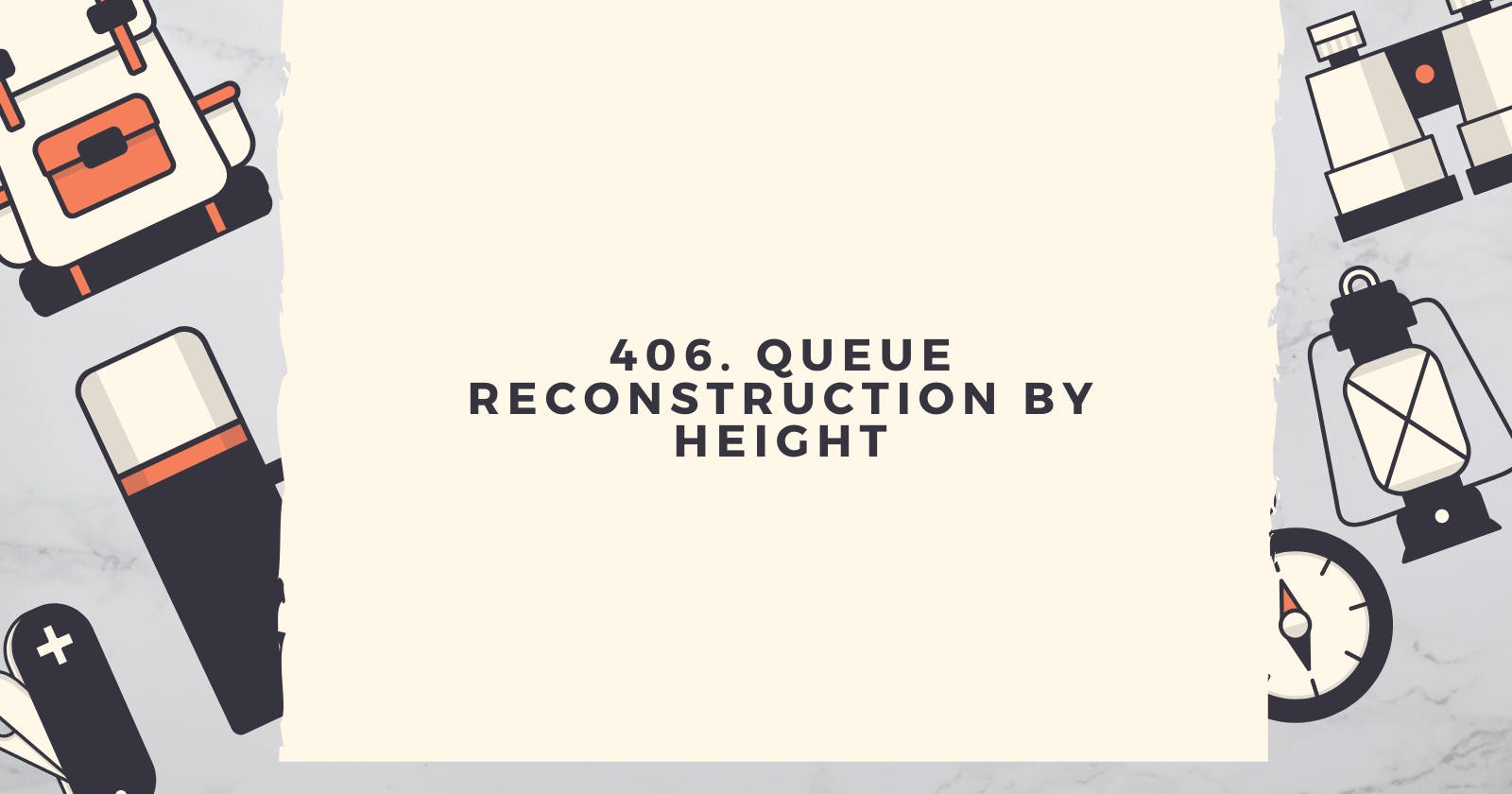PermalinkProblem:
You are given an array of people, people, which are the attributes of some people in a queue (not necessarily in order). Each people[i] = [hi, ki] represents the ith person of height hi with exactly ki other people in front who have a height greater than or equal to hi.
Reconstruct and return the queue that is represented by the input array people. The returned queue should be formatted as an array queue, where queue[j] = [hj, kj] is the attributes of the jth person in the queue (queue[0] is the person at the front of the queue).
Example 1:
Input: people = [[7,0],[4,4],[7,1],[5,0],[6,1],[5,2]]
Output: [[5,0],[7,0],[5,2],[6,1],[4,4],[7,1]]
Explanation:
Person 0 has height 5 with no other people taller or the same height in front.
Person 1 has height 7 with no other people taller or the same height in front.
Person 2 has height 5 with two persons taller or the same height in front, which is person 0 and 1.
Person 3 has height 6 with one person taller or the same height in front, which is person 1.
Person 4 has height 4 with four people taller or the same height in front, which are people 0, 1, 2, and 3.
Person 5 has height 7 with one person taller or the same height in front, which is person 1.
Hence [[5,0],[7,0],[5,2],[6,1],[4,4],[7,1]] is the reconstructed queue.
Example 2:
Input: people = [[6,0],[5,0],[4,0],[3,2],[2,2],[1,4]]
Output: [[4,0],[5,0],[2,2],[3,2],[1,4],[6,0]]
Constraints:
1 <= people.length <= 20000 <= hi <= 1060 <= ki < people.length- It is guaranteed that the queue can be reconstructed.
PermalinkSolution:
class Solution {
public int[][] reconstructQueue(int[][] people) {
int len = people.length;
List<People> list = new ArrayList<>();
for(int[] person: people) {
list.add(new People(person[0], person[1]));
}
// Sort in ascending order of k if heights are same else sort in descending order based on height
Collections.sort(list, (a, b) -> (a.height == b.height) ? a.front - b.front : b.height - a.height);
List<People> sortedList = new ArrayList<>();
for (People person : list) {
// insert at the index and shift the number if it's already present
// like for (5,0) shift the (7,0) and then add 5 in 0 th position
sortedList.add(person.front, person);
}
int[][] result = new int[len][2];
for(int i=0; i<len; i++) {
result[i] = sortedList.get(i).toArray();
}
return result;
}
}
class People {
int height;
int front;
public People(int height, int front) {
this.height = height;
this.front = front;
}
public int[] toArray() {
return new int[] {height, front};
}
}
Time Complexity: O(nlogn + n^2) = O(n^2): We sort the array in O(nlogn) time and list insertion will take O(n^2) for n insertions at worst.
Space Complexity: O(n)
Subscribe to our newsletter
Read articles from Leetcode Practice directly inside your inbox. Subscribe to the newsletter, and don't miss out.


Article Series
Leetcode Daily
1710. Maximum Units on a Truck (30/06/2022)
Problem: You are assigned to put some amount of boxes onto one truck. You are given a 2D array box…
406. Queue Reconstruction by Height (29/06/2022)
Problem: You are given an array of people, people, which are the attributes of some people in a que…
1689. Partitioning Into Minimum Number Of Deci-Binary Numbers (27/06/2022)
Problem: A decimal number is called deci-binary if each of its digits is either 0 or 1 without…
1423. Maximum Points You Can Obtain from Cards (26/06/2022)
Problem: There are several cards arranged in a row, and each card has an associated number of point…
665. Non-decreasing Array (25/06/2022)
Problem: Given an array nums with n integers, your task is to check if it could become non-decre…
1354. Construct Target Array With Multiple Sums (24/06/2022)
Problem: You are given an array target of n integers. From a starting array arr consisting of n…
630. Course Schedule III (23/06/2022)
Problem: There are n different online courses numbered from 1 to n. You are given an array cou…
215. Kth Largest Element in an Array (22/06/2022)
Problem: Given an integer array nums and an integer k, return the kth largest element in the a…
1642. Furthest Building You Can Reach (21/06/2022)
Problem: You are given an integer array heights representing the heights of buildings, some brick…
820. Short Encoding of Words (20/06/2022)
Problem: A valid encoding of an array of words is any reference string s and array of indices indice…